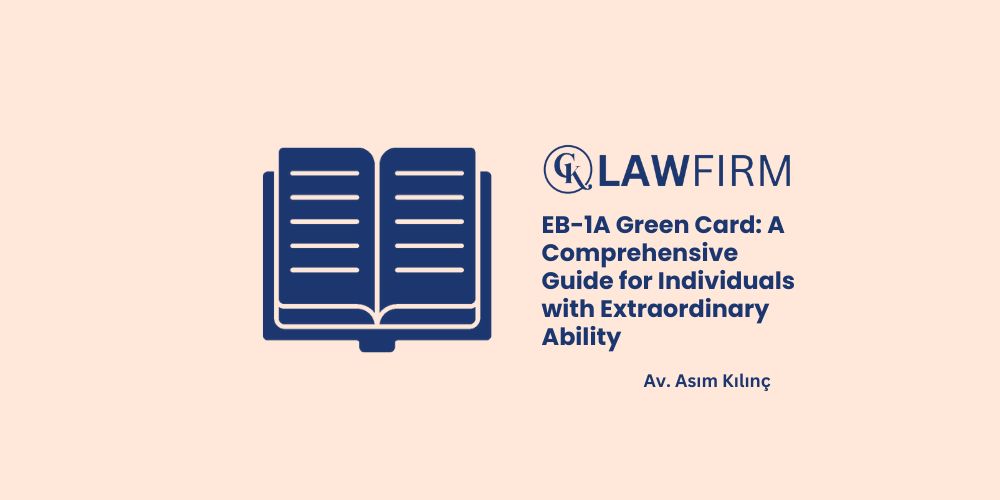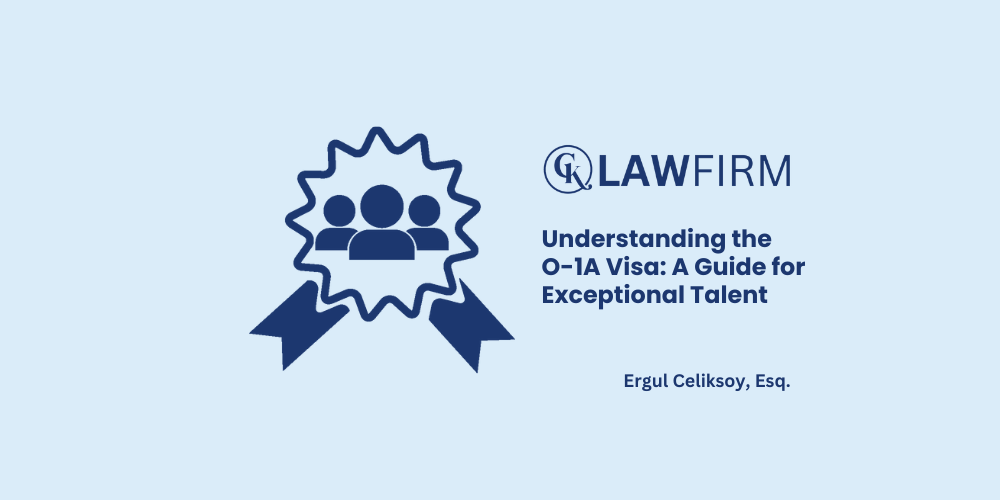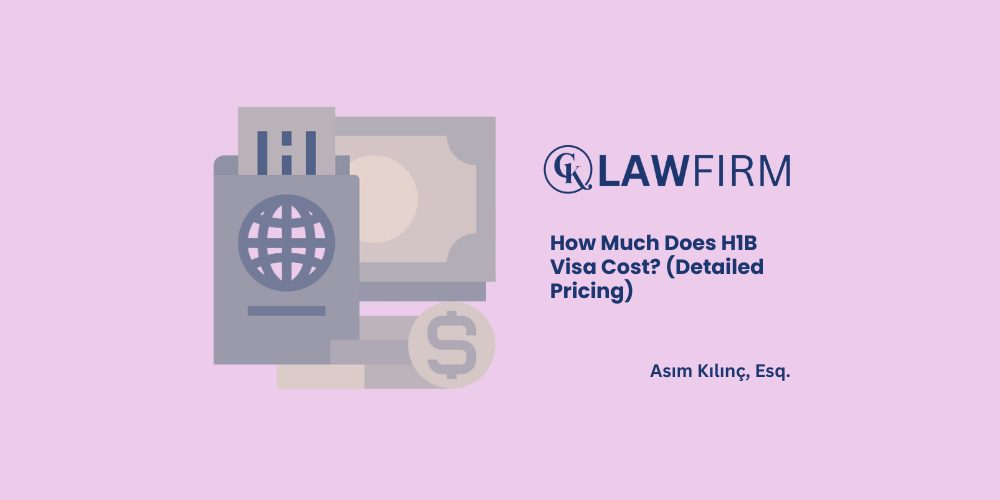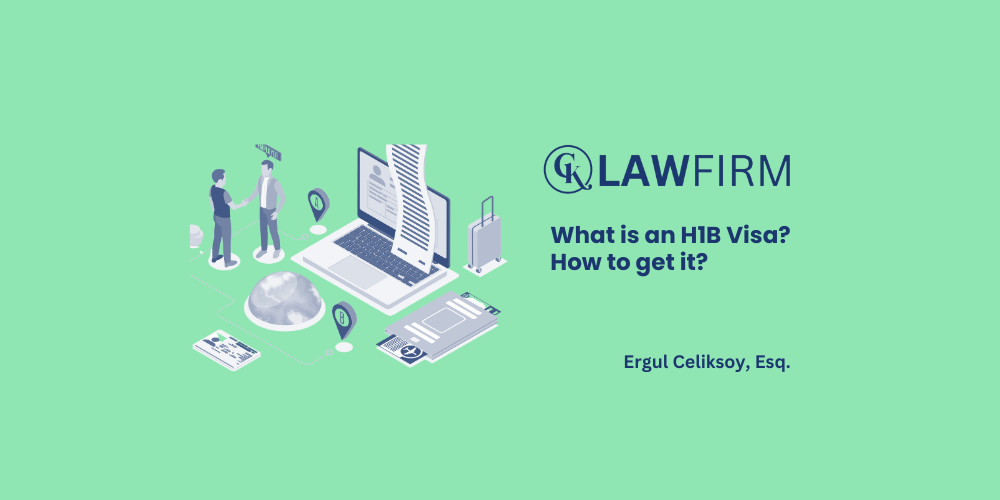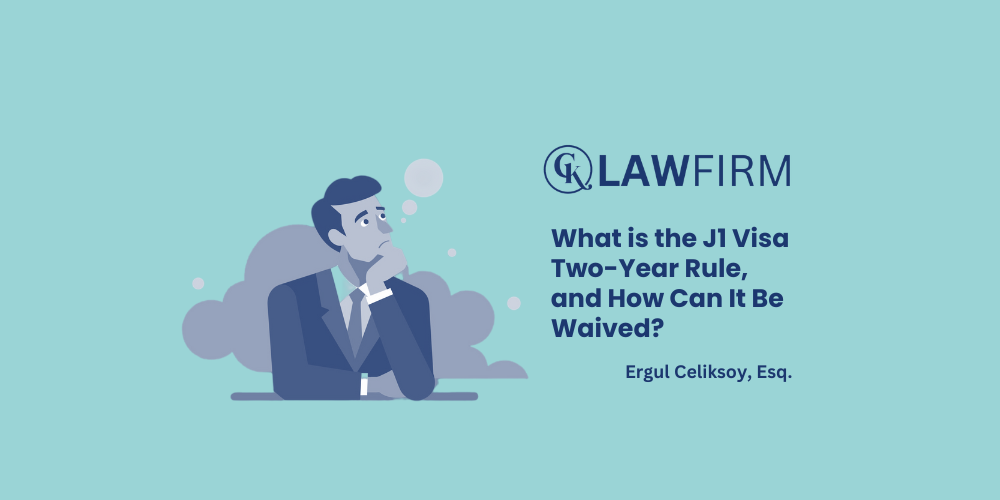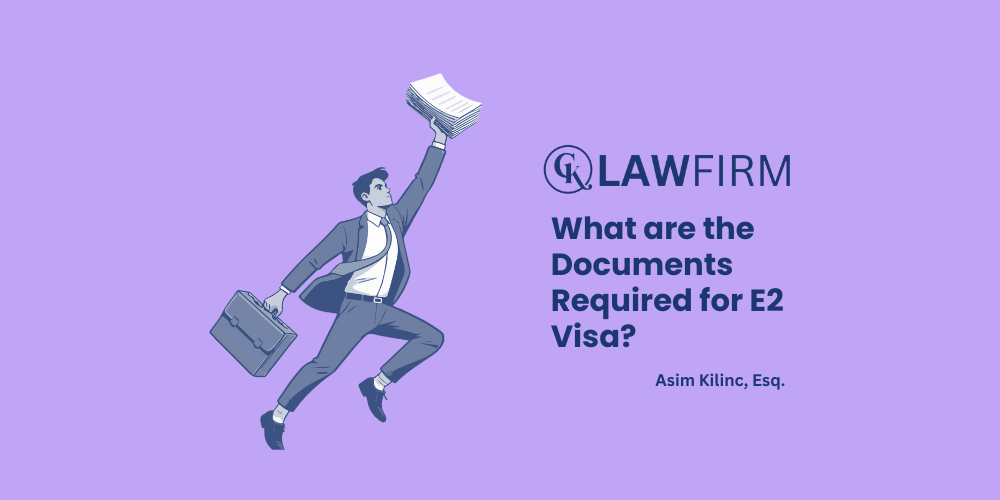Schedule an Appointment with Our Attorneys Now
- Introduction
- Overview of the EB-1A green card
- Who it’s for and what this guide will cover
- What Is the EB-1A Visa?
- Definition and purpose
- Differences between EB-1A and other employment-based visas
- Flexibility of self-petitioning
- Who Qualifies for the EB-1A Green Card?
- Eligibility criteria
- List of USCIS’s 10 qualifying categories
- Meeting at least 3 of the 10 criteria
- EB-1A Visa Application Process
- Filing Form I-140
- Self-petitioning process
- Adjustment of status vs. consular processing
- Advantages of the EB-1A Visa
- No job offer or labor certification required
- Faster processing
- Ideal for top-tier professionals
- Frequently Asked Questions
- How to prove extraordinary ability
- Self-petition details
- Difference from O-1 visa
- Family inclusion
- How CK Law Firm Can Help
- Legal strategy and documentation help
- Guidance through USCIS communication
- Support with I-140 and beyond
- Conclusion
- Summary of benefits
- Begin the EB-1A process with legal help
For individuals with extraordinary ability in the sciences, arts, education, business, or athletics, the EB-1A green card offers a direct path to U.S. permanent residency. Unlike many other employment-based immigration options, the EB-1A visa does not require a job offer or labor certification. This employment-based green card category is designed for those who have achieved national or international acclaim and can prove their accomplishments to USCIS.
In this comprehensive guide, we’ll explain how to qualify for an EB-1A green card, what documents are needed, and how to navigate the visa application process.
What Is the EB-1A Visa?
The EB-1A visa, also known as the Extraordinary Ability Green Card, is a first-preference employment-based immigrant visa. It is available to individuals who can demonstrate extraordinary ability in their field through sustained national or international acclaim.
The U.S. Citizenship and Immigration Services (USCIS) allows qualified applicants to self-petition for this visa, making it an attractive option for those without a U.S. employer sponsor. It falls under the EB-1 visa category, which also includes outstanding professors and multinational executives, but the EB-1A is unique in its flexibility.
Who Qualifies for the EB-1A Green Card?
To be eligible, applicants must demonstrate extraordinary ability in their field through evidence of accomplishments that are nationally or internationally recognized. USCIS provides 10 criteria for qualification. To qualify, you must meet at least 3 of these 10 requirements:
EB-1A Visa Requirements:
- Receipt of internationally recognized prizes or awards for excellence
- Membership in associations that require outstanding achievements
- Published material about you in major media or trade publications
- Participation as a judge of others in the same or allied field
- Original contributions of major significance
- Authorship of scholarly articles
- Work displayed at artistic exhibitions or showcases
- Leading or critical roles in distinguished organizations
- High salary compared to others in the field
- Commercial success in performing arts
Applicants must demonstrate extraordinary ability with documentation that proves their eligibility.
You don’t need a job offer or employer sponsorship to apply, and labor certification is not required.
EB-1A Visa Application Process
The EB-1A application process involves two key stages:
- Filing Form I-140 (Immigrant Petition for Alien Worker):
- You must file Form I-140 with USCIS.
- Include evidence that you meet at least three of the required criteria.
- You can self-petition, meaning no job offer or employer is needed.
- Applying for a Green Card (Form I-485 or Consular Processing):
- If inside the U.S., you file Form I-485 to adjust your status.
- If outside the U.S., you go through consular processing at a U.S. embassy or consulate.
Processing times vary, but premium processing is available for the I-140 petition.
Advantages of the EB-1A Visa
The EB-1A visa offers several unique benefits compared to other employment-based immigration categories:
- No job offer required
- No labor certification needed
- Self-petitioning allowed
- Faster processing times compared to other visa categories
- Ideal for individuals with exceptional talent or achievements
It is especially suitable for entrepreneurs, researchers, scientists, artists, and athletes who are internationally recognized.
Frequently Asked Questions
How do I prove extraordinary ability?
You must provide strong documentation. Meeting at least three of USCIS’s ten listed criteria is required. The more evidence you submit, the better your chances.
Can I apply for a green card without a job offer?
Yes. The EB-1A green card allows individuals with extraordinary ability to self-petition. A job offer is not required.
What is the difference between EB-1A and O-1 visa?
The O-1 visa is a temporary work visa, while the EB-1A is a path to permanent residency. Both require evidence of extraordinary ability, but the EB-1A leads to a green card.
Can I bring my family with me?
Yes. Spouses and unmarried children under 21 may apply for immigrant visas as dependents.
How CK Law Firm Can Help
Navigating the EB-1A visa process requires careful preparation. At CK Law Firm, we help individuals who can demonstrate extraordinary ability gather the required documentation, file a strong petition, and respond to any USCIS requests.
Whether you’re an artist, athlete, scientist, or entrepreneur, our experienced team can guide you through securing an EB-1A green card.
Conclusion
The EB-1A green card is a powerful option for individuals with exceptional skills seeking to live and work permanently in the U.S. With no job offer or labor certification required, this employment-based immigrant visa is both flexible and efficient.
If you’re ready to apply for a green card based on your extraordinary ability, contact CK Law Firm today. Let us help you begin your journey toward U.S. permanent residency.
- Introduction
- Brief overview of the O-1A visa
- Who it’s for and why it matters
- What Is the O-1A Visa?
- Simple definition
- Difference between O-1A and O-1B
- Purpose and scope of the visa
- Who Qualifies for the O-1A Visa?
- Eligibility criteria
- Examples of qualifying professions
- What counts as “extraordinary ability”
- The O-1A Visa Application Process
- Step-by-step guide
- USCIS petition (Form I-129)
- Role of sponsor or agent
- What Documents and Evidence Do You Need?
- Types of supporting evidence
- Documentation of achievements and acclaim
- Building a strong case
- Benefits of the O-1A Visa
- Work rights in the U.S.
- Family members (O-3 Visa)
- Duration and extensions
- Frequently Asked Questions About the O-1A Visa
- Job offer requirements
- Green card possibilities
- Changing employers
- How CK Law Firm Can Help with Your O-1A Visa Petition
- Legal support
- Experience with USCIS
- Value-added services
- Conclusion
- Recap
- Encouragement to apply with legal guidance
For individuals with extraordinary abilities in science, education, business, or athletics, the O-1A visa offers a unique opportunity to work in the U.S. This visa type is part of the O-1 visa classification, designed specifically for individuals who have demonstrated a record of extraordinary achievement in their field. In this comprehensive guide, we’ll explain the O-1A visa process in plain terms and help you understand whether this visa might be right for you.
What Is the O-1A Visa?
The O-1A visa is a nonimmigrant visa for individuals with extraordinary ability or achievement in fields such as science, business, education, or athletics. Unlike the O-1B visa, which is for arts or extraordinary achievement in the motion picture and television industry, the O-1A is strictly for those with exceptional talent in technical and professional fields.
The United States Citizenship and Immigration Services (USCIS) classifies the O-1 visa into two main types: O-1A and O-1B. Both visa categories are intended for individuals who are at the top of their field, but they differ in area of extraordinary ability.
Who Qualifies for the O-1A Visa?
To qualify for the O-1A visa, you must demonstrate extraordinary ability in your field through sustained national or international acclaim. This means having a track record of exceptional achievements that place you among the top of your field.
Eligibility requirements include:
- Awards or prizes for excellence
- Membership in associations that require outstanding achievements
- Published material about your work
- A high salary or other evidence of outstanding income
- Participation as a judge of the work of others
- Original contributions of major significance
You do not have to meet every criterion, but your O-1 petition must demonstrate extraordinary ability through strong supporting evidence.
The O-1A Visa Application Process
The application process can be complex, and it begins with a U.S. employer or agent filing Form I-129, Petition for a Nonimmigrant Worker, with USCIS on your behalf. You cannot self-petition for this visa.
Steps in the O-1A visa petition process:
- Find a U.S. sponsor or agent.
- Submit Form I-129 and supporting documentation.
- Include an advisory opinion from a peer group or expert organization.
- Show evidence of your extraordinary ability in the field.
Once your petition is approved, you can apply for your visa at a U.S. consulate or embassy abroad. USCIS processing time varies, but premium processing is available for faster results.
What Documents and Evidence Do You Need?
Your visa application must include clear documentation that proves your extraordinary abilities. USCIS will look for compelling, well-organized evidence of your accomplishments.
You should prepare:
- Proof of awards and honors
- Press and media coverage
- Contracts and job offers
- Letters from experts in your field
- Documentation of salary, memberships, and achievements
You must demonstrate extraordinary ability in their field, and each document should support your case as an O-1 beneficiary.
What Are the Benefits of the O-1A Visa?
The O-1A visa offers several advantages for exceptional individuals:
- Ability to work in the United States legally
- Initial stay of up to three years, with extensions allowed
- Eligibility to bring family under the O-3 visa category
- No annual cap like the H-1B visa
For many, this is a preferred work visa due to its flexibility and high level of recognition.
Frequently Asked Questions About the O-1A Visa
Can I apply for a green card while on an O-1A visa?
Yes, O-1 visa holders can apply for a green card. Many transition to the EB-1A Extraordinary Ability Green Card Visa or EB-2 NIW (National Interest Waiver) Visa categories.
Do I need a job offer to apply for an O-1 visa?
Yes, you must have a U.S. sponsor or agent to submit the visa petition. You cannot apply on your own.
How long is the O-1A visa processing time?
USCIS processing time can vary but generally takes 2 to 3 months. Premium processing reduces this to 15 calendar days.
How CK Law Firm Can Help with Your O-1A Visa Petition
At CK Law Firm, we have successfully handled O-1A and O-1B visa petitions for individuals with exceptional talent. We understand what USCIS looks for and how to frame your case for success. Whether you’re applying for an O-1A visa or exploring eligibility for an O-1B visa, we can provide a thorough strategy and support.
Our team ensures your visa application is strong, your petition is complete, and your evidence of extraordinary ability is clearly presented.
Conclusion
The O-1A visa is an ideal solution for individuals with extraordinary talent who want to work in the U.S. If you’ve demonstrated a record of extraordinary achievement, this visa type may open doors to exciting opportunities.
To learn more or begin your O-1A visa application, contact CK Law Firm today. We’re here to guide you through the O-1 visa process with clarity, confidence, and care.
Asım Kılınç, Immigration Attorney, CK Law Firm
The H1B visa, which is also preferred by foreign professionals who want to work in the United States, involves various payments during the application process. These fees consist of different items that concern both the applicant and the employer. The H1B visa cost may vary depending on the current regulations of the year of application, expedited processing content and foreign exchange rules.
In this guide, I provide detailed information about the H1B visa price, payment items and total costs. In this article, you can find answers to the following questions:
- What Does the H1B Visa Cover?
- How Many Dollars is an H1B Visa?
- America H1B Visa Fee: Costs for Employer and Applicant
- H1B Visa Premium Processing Fee: Expedited Processing Cost
If you have any questions about the H1B visa other than these topics, please feel free to contact me via the comments section below this article or by sending me a message directly via LinkedIn. Don’t forget that you can also send me your questions through the web page of CK Law Firm Immigration Law Firm, which I am the co-founder of!
What Does an H1B Visa Cover?
The H1B visa is designed for employers who wish to hire foreign professionals to work in the United States in certain specialized occupations. These occupational groups include jobs that require a high level of education and expertise in fields such as technology, engineering and finance. Individuals who wish to obtain this visa must first receive a job offer from an American employer. The employer must first submit an approved Labor Condition Application (LCA) from the U.S. Department of Labor in order to apply to U.S. Citizenship and Immigration Services (USCIS) on your behalf.
An application has multiple cost items. The basic costs consist of the application fee, the fraud prevention fee and the training fund fees that the employer has to pay. There is also an optional premium processing fee to expedite the processing.
However, once you have an H1B visa, you can get the right to work in the US for 3 years. Then, if you request an extension, you can continue to work in the US by extending this visa. Moreover, in some cases, it may be possible to convert your H1B visa into a Green Card.
How Many Dollars is an H1B Visa?
The question of how many dollars an H1B visa costs is a question that many professionals ask. There are several stages in the application process and these costs are usually covered by the employer. First, a registration fee is paid for the H1B visa. This means that if the application is accepted, the employer must pay the Form I-129 (Petition for Alien Employee) filing fee.
- Registration Fee: Registration of application for H1B visa $215
- Form I-129 Fee: Once the application is accepted, payment amounts vary depending on the size of the employer’s company. For large businesses, the fee is $780. For small businesses and non-profit organizations, the fee is $460.
Regulations on the US visa fee are shaped by the fees set by the US Department of State according to the law. However, it should not be ignored that these fees may change over time.

America H1B Visa Fee: Costs for Employer and Applicant
The US H1B visa fee policy, which has different payments between the employer and employee, has different requirements for both parties. These fees are paid at different stages of the application process and the responsibilities of the parties are clearly defined.
Wages Covered by the Employer:
- Filing Fee: The employer pays a filing fee of $460 or $780 for Form I-129 submitted to USCIS.
- Attorney Fees: Lawyers’ fees are paid by the employer to provide legal support during the visa application process.
Fees Covered by the Applicant:
- Consular Visa Application Fee: The applicant pays a visa application fee of USD 190 at the time of the visa interview at the US consulate.
It is also very important that you pay attention to the important points I have mentioned below. These points are of great importance in the smooth progress of your visa process.
- The employer cannot legally charge certain fees for the application process to the employee; they must pay these fees themselves.
- The applicant is responsible for personal costs, such as the consular visa application fee.
- The cost of additional services, such as premium processing fees, is determined by agreement between the employer and the employee.
H1B Visa Premium Processing Fee: Expedited Processing Cost
The H1B visa premium processing fee is an option for employers who want to expedite the application process. With the premium processing option, USCIS commits to finalize your petition within 15 business days. This service costs $2,805 and is usually paid by the employer.
Premium processing is particularly favored when the application process falls within a critical timeframe. However, the premium processing fee only speeds up USCIS processing time; it has no impact on consular interview and visa approval times.
You can contact us for more information about the US H1B visa and get expert support for your immigration process. You can also reach me anytime on Linkedin and we can schedule a meeting for any questions you may have about the process.
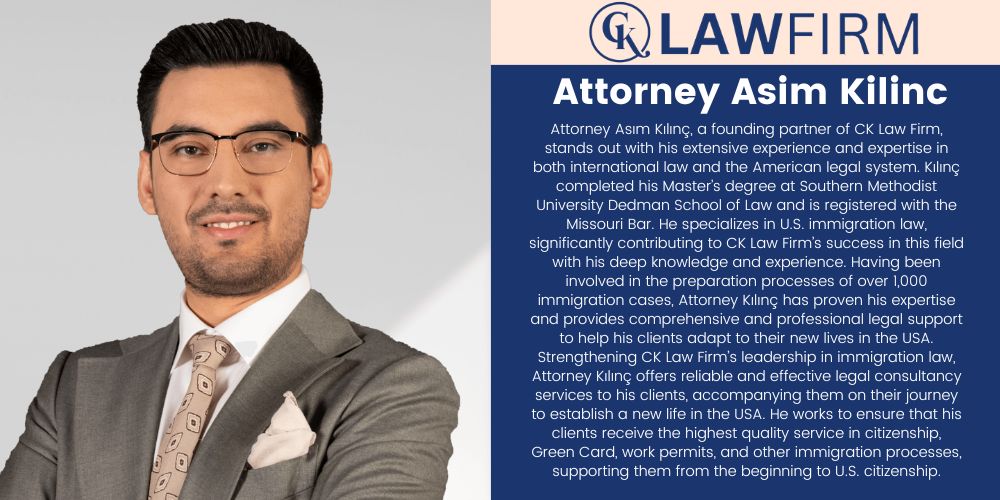
By Ergul Celiksoy, Immigration Attorney at CK Law Firm
What is an H1B Visa? The H1B visa is a work visa designed for professionals who want to work temporarily in the United States. It is a type of visa applied by individuals working in fields such as technology, engineering, finance and health. This visa makes it easier for US employers to hire talented employees.
The H-1B visa application is made with the support of an employer operating in the US. In other words, this visa is not open to individual application. The employer submits a petition to the US Citizenship and Immigration Services (USCIS) on behalf of the applicant. Once approved, the applicant can enter the US with a work permit. If you want to pursue a career in the US, it is critical that you have detailed information about the H1B visa and create the right strategy. In this article, I will discuss the following topics about the H-1B visa:
- What is an H–1B Visa?
- How to Get an H-1B Visa?
- H-1B Visa Application Requirements and Dates
- H-1B Visa Prices: What are the Current Costs?
- H-1B Visa and Advantages of Working in the USA
If you have any other questions about the H1B visa, please feel free to contact me via the comments section at the bottom of this article, by sending me a message directly via Linkedln, or via the Webpage of CK Law Firm Immigration Law Firm, which I co-founded!
What is an H-1B Visa?
The H1B work permit is an immigration program that allows qualified individuals to work in the United States for specific periods of time. It is usually also intended for foreign professionals working in specialized sectors such as technology, healthcare, engineering and finance.
The H-1B visa makes it easier for US employers to hire qualified and skilled workers from abroad. The H1B work permit, which cannot be applied for without the sponsorship of an employer, is initially granted for 3 years and can be extended under certain conditions.
For foreigners aiming for a career in the US, H1B work authorization can help them take their work experience to a global level and create long-term residency opportunities. In addition, applicants must have a bachelor’s degree in the relevant field or equivalent professional experience.
How to Get an H-1B Visa?
There are certain conditions for obtaining an H-1B visa. If you comply with these conditions, your application is more likely to be successful. The process proceeds in two different ways for the employer and the employee. First of all, what the employer must do:
- Employer Sponsorship: The first step of the application is for an American employer to sponsor you. The employer applies to USCIS (US Citizenship and Immigration Services) with documents proving the requirements of the position and your qualifications.
- Labor Condition Application (LCA): The employer must submit the LCA to the U.S. Department of Labor, along with documentation confirming that you are a suitable candidate for the job conditions and that the workplace is available.
- Petition for Foreign Employee (Form I-129): The employer files an H1B petition on your behalf. This petition is necessary to prove that the employer needs a foreign worker for the position.
Different procedures are applied for those who want to become employees. The process here proceeds as follows:
- Educational Qualifications: You must provide proof of licensure that proves you are skilled and qualified for the position offered.
- Job Offer: You must have a valid job offer from a US employer for a specialized occupation.
- Work Experience: You should prepare documents to prove your experience that you are competent enough in your profession.
After USCIS (US Citizenship and Immigration Services) reviews the application and approves the petition, you move on to the other stages of the process. The consular interview is an important part of the H-1B visa process. In this interview, your documents supporting your work permit are examined and if found appropriate, your visa is approved. Apart from this, if you have any questions about how to get an H-1B visa, you can contact us via our CK Law Firm Immigration Law Firm’s Web Page.
H-1B Visa Application Requirements and Dates
H-1B visa requirements include educational level, professional specialization and employer support. The applicant must have at least a bachelor’s degree and the position requires special expertise. The employer must prove that the position applied for cannot be filled in the pool of employees in the US. Salary and working conditions must also be in line with industry standards.
US H-1B visa application deadlines usually start in April each year and continue until the quota set by USCIS (US Citizenship and Immigration Services) is filled. The annual quota is usually limited to 85,000 people and therefore applications are completed within a few days. If the number of registrations exceeds the limit due to high demand, people can be randomly selected through a lottery system.

H-1B Visa Prices: What are the Current Costs?
H-1B visa prices are an intriguing cost for both the applicant and the employer. As of 2024, I can say that the application fee has changed for both the employee and the employer. At this point, with the fees changing every year, you need to follow the amount you plan for your application correctly.
For example, for H-1B visa prices, the amount that the employee has to pay in 2023 is $10, while in 2024 this amount is $215. While the amount that the employer has to pay was $2,500 in 2023; this payment increased to $2,805 in 2024. In this case, the total payment for H-1B visa in 2024 is $3,020.
H-1B Visa and Advantages of Working in the USA
The H-1B visa offers many advantages to international workers. First of all, these visa holders can work legally in the US for 3 years. In addition, those who work under certain conditions have the opportunity to extend this period if they wish. At the same time, the family of the visa holder can accompany him/her by obtaining an H-4 visa. H-4 visa holders can study in the US and in some cases, they can also obtain a work permit.
The H-1B visa provides a strong foundation to realize your career goals. Working in the US is a unique opportunity for those who want to gain international experience and expand their future career opportunities.
If you are planning to apply for an H-1B visa, you can contact us about the process. If you have any questions, please do not forget that you can contact me via the comments section at the bottom of this article, by sending me a message directly on Linkedln or via the website of CK Law Firm Immigration Lawyer, which I co-founded!
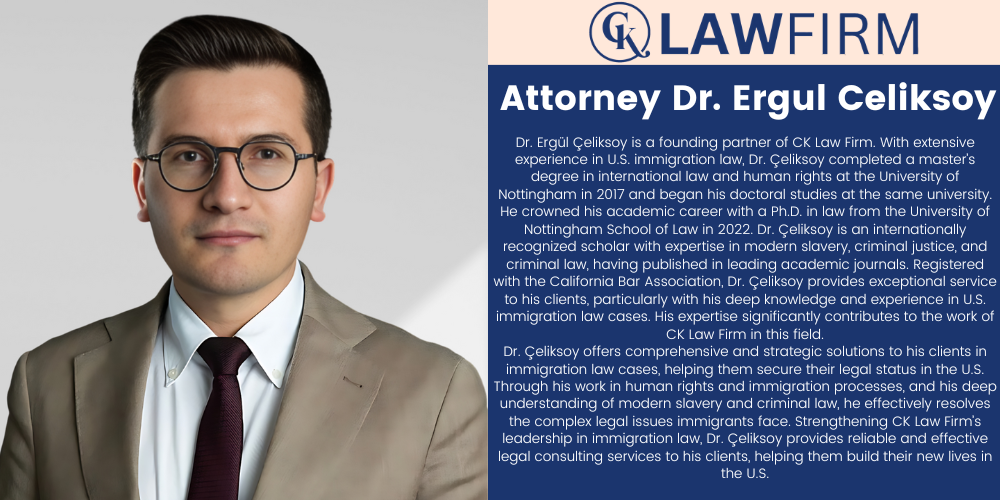
By Ergul Celiksoy, Immigration Attorney at CK Law Firm
As an immigration attorney, one of the most frequently asked questions by my clients who wish to work or study in the United States concerns the J1 visa’s two-year rule. In this article, I will provide answers to the most common questions about the J1 visa’s two-year rule, based on the numerous cases I have handled and the hundreds of clients I have consulted. By the end of this article, you will have answers to the following questions:
- What is the J1 Visa?
- What is the J1 Visa Two-Year Rule?
- When Does the Two-Year Rule Apply?
- Is It Possible to Obtain a Waiver for the Two-Year Rule?
- How to Waive the J1 Visa Two-Year Rule?
- Waiver Application Process
If you have any further questions about the J1 visa, please feel free to reach out to me via the comments section below, send me a direct message on LinkedIn, or contact me through the CK Law Firm Immigration Attorney Firm’s website, of which I am a founding partner.
What is the J1 Visa?
The J1 visa is a type of exchange visa used for participating in education, training, or cultural exchange programs in the United States. This visa is typically granted to students, researchers, teachers, and other participants who need to be in the U.S. for a specific period. J1 visa holders are generally required to return to their home country after completing their program. The J1 visa programs are managed by the U.S. Department of State and supported by specific sponsor organizations. The J1 visa has various categories, including:
- J1 Trainee: Allows individuals with a specific university degree or expertise in a certain field to work in the U.S.
- J1 Intern (Internship): A category for students currently enrolled in educational institutions or recent graduates.
- Work and Travel (WAT): A category used by university students in their home country to work and travel in the U.S. during the summer.
- Other J1 Categories: There are also categories for teachers, camp counselors, au pairs, physicians, and secondary school students.
What is the J1 Visa Two-Year Rule?
Some J1 visa holders are required to return to their home country or their country of residence for the past five years after their visa expires. This rule is known as the “J1 Visa Two-Year Rule.” This rule restricts J1 visa holders from applying for certain immigration statuses, such as a Green Card, H1B work visa, K1 fiancé visa, or L1 transfer visa, for two years.
When Does the Two-Year Rule Apply?
The two-year rule does not apply to every J1 visa holder. Whether this rule applies depends on specific criteria:
- Programs Financed by the U.S. or Home Government:
If your J1 visa program is funded by the U.S. government, your own government, or an international organization, this rule may apply to you. This means that if your program was supported by the U.S. government or you received financial support from your home country, the rule may be enforced. - Skills List:
The U.S. Department of State publishes a list that identifies critical skills and professions in certain countries. If your education or experience falls under one of these skills, you may be subject to the two-year rule. This is because there is a high demand for such skills in your home country, and you are expected to return to contribute to your country after your training in the U.S. - Medical Training:
If you received a J1 visa for medical training in the U.S., the two-year rule may apply to you. This rule encourages medical professionals to return to their home countries to apply their knowledge and experience within their communities.
Is It Possible to Obtain a Waiver for the Two-Year Rule?
In some cases, a waiver can be obtained to bypass the J1 visa two-year rule. However, obtaining this waiver is not an easy process and is subject to specific conditions:
- Government Approval: Your home government may exempt you from the two-year return requirement. This is possible with an official authorization from the relevant authorities in your home country.
- Hardship Situation: If you have a U.S. citizen or Green Card holder spouse or child, and complying with the two-year rule would cause significant hardship to them, this can be considered as grounds for a waiver. Hardship can include family separation or financial difficulties.
- Risk of Persecution: If you can prove that you would face persecution in your home country due to political, religious, or other reasons, you may also apply for a waiver. This generally applies to situations involving serious human rights violations or risk of persecution.
How to Waive the J1 Visa Two-Year Rule?
Individuals in the U.S. on a J1 visa who are subject to the two-year rule can waive this rule under specific conditions. Obtaining a waiver may allow you to stay in the U.S. permanently or change to another immigration status.
- No Objection Statement from Your Home Government:
You can obtain a waiver from your home government for the two-year return requirement. This document is issued by the competent authorities of your home country and submitted to the U.S. Department of State. To obtain this document, you generally need to contact the U.S. Embassy or Consulate in your country. - U.S. Government or Agency Approval:
If your J1 visa program was funded by the U.S. government or a U.S. government agency, you may need approval from that agency to obtain a waiver. In such cases, the agency must authorize that you are not subject to the two-year rule. - Exceptional Hardship:
If you have a U.S. citizen or Green Card holder spouse or child and can prove that complying with the two-year rule would cause significant hardship to them, you can apply for a waiver on these grounds. Hardship could include financial difficulties, health problems, or family separation. - Risk of Persecution:
If you can prove that you would face persecution due to political, religious, ethnic, or other reasons if you return to your home country, you may be eligible for a waiver from the two-year rule. This waiver typically requires a thorough examination of your case. - Interested Government Agency Waiver:
A U.S. government agency can request a waiver from the two-year rule. This is usually applicable when the J1 visa holder’s stay in the U.S. is considered essential for national interests. For example, a research institution in the U.S. may request such a waiver if they want you to continue your research projects.
Waiver Application Process
- DS-3035 Form: First, you need to fill out the DS-3035 form to apply for a waiver from the two-year rule. This form can be obtained from the U.S. Department of State’s website.
- Required Documents: Depending on your situation, you must prepare the relevant documents. These documents should include proof of your situation (e.g., a No Objection Statement from your home government, hardship documents, persecution risk evidence, etc.).
- Application Fee: A fee is required to submit a waiver application. The fee amount may vary over time, so it is important to check the latest information before applying.
- Application Process: The application process is reviewed by the U.S. Department of State and may take several months. You can stay in contact with the Department during the process to get updates on your application status.
Conclusion
The J1 visa two-year rule can significantly impact your stay in the U.S. and future immigration options. This rule is crucial, especially for J1 visa holders who wish to stay or work in the U.S. It is important to carefully review your visa documents to understand whether the rule applies to you and plan your future accordingly.
If you wish, you can reach us at cklawfirm.org, via email at info@cklawfirm.org, or directly on LinkedIn to find out if you are eligible for a J1 visa waiver with our free consultation service. All you need to do is send us your CV. We will review your CV and get back to you within 24 hours.
Who is Attorney Ergül Çeliksoy?
Attorney Dr. Ergül Çeliksoy is the co-founder of CK Law Firm and also serves as an Assistant Professor of Law at the University of Nottingham. With extensive experience in U.S. immigration law, Dr. Çeliksoy completed his master’s degree in international law and human rights at the University of Nottingham in 2017 before beginning his Ph.D. studies at the same university. Dr. Çeliksoy earned his Ph.D. in law at the University of Nottingham School of Law in 2022, marking a significant milestone in his academic career. He is a recognized academician with expertise in modern slavery, criminal justice, and criminal law, with publications in leading academic journals.
As a member of the California Bar, Dr. Çeliksoy provides outstanding service to his clients, particularly in U.S. immigration law cases. His knowledge and experience in immigration law are valuable assets to CK Law Firm’s practice in this field. Dr. Çeliksoy offers comprehensive and strategic solutions to his clients in immigration law cases, helping them secure their legal status in the U.S. His deep understanding of human rights and immigration processes, along with his expertise in modern slavery and criminal law, enables him to effectively address the complex legal issues faced by immigrants. By offering reliable and effective legal counseling services, Dr. Çeliksoy helps his clients build new lives in the U.S.
By Asim Kilinc, Immigration Attorney at CK Law Firm
In this article, I will address some of the most frequently asked questions about the E2 Investor Visa based on the numerous files I’ve prepared and the hundreds of clients I’ve consulted with. By the end of this article, you will find answers to the following questions:
- What is the E2 Investor Visa?
- What Documents are Required for the E2 Visa?
- The E2 Visa Application Process and After
If you have any additional questions about the E2 Investor Visa, please feel free to reach out to me through the comments section below, via LinkedIn, or directly through the website of CK Law Firm, the immigration law firm I co-founded.
What is the E2 Investor Visa?
The E2 Investor Visa is a non-immigrant visa that allows individuals from specific treaty countries to invest a significant amount in a U.S. business, enabling them to either start a new enterprise or take over an existing one. This visa allows the investor to reside in the United States and manage their business.
The E2 visa also permits the investor’s immediate family members (spouse and children under 21) to live in the U.S. However, it is important to note that this visa does not lead directly to a Green Card. The visa can be extended as long as the investment is ongoing, and the business remains successful.
What Documents are Required for the E2 Visa?
The E2 Visa offers a significant opportunity for entrepreneurs and investors looking to invest in the United States. However, applying for the E2 Visa requires careful attention to various documents and criteria. Here are the essential documents:
Passport
The applicant must have a valid passport. It is crucial that the passport remains valid throughout the visa duration.
DS-160 Application Form
The DS-160 form is the online application form for U.S. visas, including the E2 visa. This form must be filled out online and submitted as part of the application process.
Photograph
A biometric photograph that meets U.S. visa standards is required. The photo should be taken against a white background and must have been taken within the last six months.
E2 Business Plan
One of the most critical documents for the E2 visa application is the business plan. This plan should detail the future performance, revenue expectations, and business strategies for the investment. It usually includes a five-year projection.
Proof of Investment
Documentation proving the source of the investment and the active allocation of these funds into the business is necessary. Bank statements, transfer documents, and other financial records are essential at this stage.
Business-Related Documents
Documents proving that the applicant owns the business or holds a significant role in it are required. These can include business licenses, trade registry records, share certificates, and partnership agreements.
Employee Documents
Documents related to the employees working in the business should also be submitted. The number of U.S. citizens or Green Card holders employed and their job positions are critical factors in the application process.
Previous Employment and Experience Documents
Reference letters, diplomas, and certificates related to the applicant’s previous work experience can be beneficial in supporting the application.
Intent to Return to Home Country
Since the E2 visa is a non-immigrant visa, a statement of intent to return to the applicant’s home country after the investment in the U.S. is concluded may be required.
E2 Visa Application Process and After
The E2 visa application process takes place at the U.S. Consulate or Embassy in the applicant’s home country. Preparing a complete application file with the correct documents and clearly presenting yourself and your business plan during the interview are crucial for a successful outcome. The E2 visa is issued for a specific period and can be renewed if necessary. However, it is essential for the visa holder to continue their business activities in the U.S. and maintain the investment for the renewal process.
Conclusion
The documents required for the E2 visa are crucial for the smooth and successful completion of the application process. Preparing these documents thoroughly and accurately increases the likelihood of a positive visa application outcome. If you are considering applying for the E2 visa, CK Law Firm is here to guide you through the process professionally and help you prepare the necessary documents correctly.
Who is Attorney Asım Kılınç?
Attorney Asım Kılınç is the co-founder of CK Law Firm and is recognized for his expertise in immigration law and U.S. asylum applications. Kılınç completed his Master’s degree at Southern Methodist University Dedman School of Law and is a member of the Missouri Bar Association, with a focus on U.S. immigration law.
Attorney Kılınç’s extensive knowledge and experience in immigration law have significantly contributed to CK Law Firm’s success in this field. He has actively participated in the preparation of over 1,000 cases, demonstrating his expertise in this area. By providing comprehensive and professional legal support to his clients, he helps them adapt to their new lives in the U.S.
Attorney Kılınç is also well-versed in U.S. asylum applications. He meticulously guides his clients through the process and ensures they receive the best legal advice. He provides top-quality service to clients in matters of citizenship, Green Card, work permits, and other immigration processes, supporting them from start to finish on their journey to U.S. citizenship.
Attorney Asım Kılınç, who solidifies CK Law Firm’s leadership in immigration law and U.S. asylum applications, offers reliable and effective legal consultancy services to clients, assisting them in building a new life in the U.S.
Subscribe to Our Newsletter
Subscribe to our newsletter to stay informed about the latest announcements and articles written by our attorneys on U.S. immigration processes.
Sobre Nosotros
Contáctanos
+1 (945) 527- 23 22
Correo electrónico
info@cklawfirm.org
Dirección
2800 Regal Rd #102, Plano, TX 75075

All Rights Reserved by CK Law Firm.


